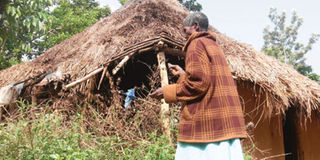Outcast widow’s plea for help

Consolata Munjal Wayodi at her compound in Kaya village in Boro, Alego Usonga. She has been ostracised from the community for refusing to be inherited when her husband died. Photo/TOM OTIENO
The whole village has labelled her an outcast. She is not allowed to leave her homestead, and even mundane tasks, such as fetching water or going to the market, are out of the question.
The 70-year-old woman’s grass-thatched house is crumbling, and she now sleeps under a mango tree in the compound.
Her sons fear rebuilding the house, lest they attract bad luck.
Mrs Consolata Munjal Wayodi’s troubles began when her husband, Joseph Wayodi Munjal, died in 2007.
He was buried in his homestead in Kaya Village of Boro, Alego-Usonga in Siaya County.
According to Luo traditions, she was supposed to undergo a cleansing ritual following her husband’s burial.
During the ritual, known as chodo kode, a widow is supposed to have sexual intercourse with a man, any man, even a stranger, so that she could be declared free to continue performing her duties in society. The controversial ritual is a prelude to wife inheritance.
Her husband had two brothers when he died, but Consolata refused to be inherited by them.
“I was already old and it would have been a disgrace to my children who are all grown-ups. I have grandchildren,” she said.
For defying her community’s traditions, she has been declared an outcast, a harbinger of bad omen.
“If I go to the river and fetch the water, the river will never be visited by anyone again, and I would be punished for that. Even when I go to fetch firewood, no one can help me put the bundle on my head. I am not wanted,” she said.
She now dreads every moment that the sun sets. In the chills of the night, she holds on to her radio and tunes in to her favourite vernacular radio station that soothes her to sleep.
She sleeps next to her husband’s grave, where she has also assembled all her belongings, fearing that the ongoing rains could bring her crumbling house down.
“I have cried till I have no more tears,” she says.
Being the first wife of the first born in the homestead, she has to plant first before everyone else is allowed to plant on their farms.
Three months ago, she planted maize on her farm for the first time since her husband died. Now all other women in the homestead have planted on their farms.
After Mr Munjal died, his second wife found another man and moved out of the compound.
She lives with her five children and husband in Boro Centre, near Consolata’s home.
Consolata’s son, Christopher Onyango, 28, is not allowed to mingle with his step brothers.
“If I happen to go to their house, I’m not allowed to eat anything there” Mr Onyango said.
When their father died, members of their Karuoth clan met and spelt out the requirements of their tradition, saying that they could die if they broke the traditions.
“We are outcasts and it makes us feel very sad because we have no control of many things. We cannot even help our own mother to repair her house,” says Mr Onyango.
Mr Onyango and his brothers cannot build their own houses because their mother’s house is still standing, she is alive and has refused to be inherited.
He now lives and works as a watchman at Boro centre. “I have to live there until my mother performs the ritual or dies and her hut is demolished,” he said.
Mrs Mariana Odera, a village elder, says nobody can come to Consolata’s rescue.
“She cannot even get the help of the church, because the members of the church are the same members of the community,” she said.
“It is a harsh tradition. It is hard to even know when she is sick. There is nothing I can do as I am also under the same traditions.”
When contacted, the chairman of the Luo Council of Elders, Ker Riaga Ogallo, called on the clan to abandon the tradition.
“There is no tradition that subjects someone to torture. It should have died a long time ago,” he said.
He called on the church and the community to come to the rescue of the widow.
“The chief should also intervene. What is the work of the chief if he can watch such a widow suffer and blame it on tradition?” he asked.




